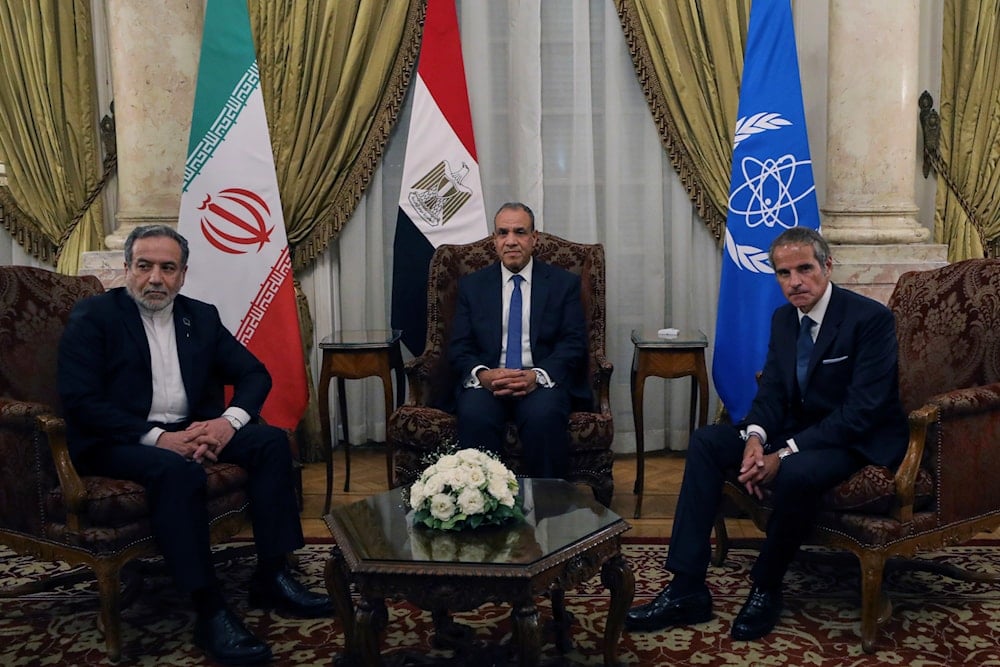Like diplomacy was attacked in June, US, E3 killed Cairo deal: Iran FM
Iran ends Cairo Agreement with IAEA, blaming the US and E3 for escalating tensions after an anti-Iran resolution was passed.
-

Egyptian Foreign Minister Badr Abdelatty meets with his Iranian counterpart Abbas Araghchi, and the Director General of the International Atomic Energy Agency (IAEA), Rafael Grossi, at Tahrir Palace in Cairo, Egypt, Tuesday, Sept. 9, 2025 (AP)
The E3 and the United States are pursuing a path of escalation, Iranian Foreign Minister Abbas Araghchi stated, emphasizing that the formal termination of the Cairo Agreement is a direct outcome of their provocations.
Araghchi announced on X Friday that Iran is terminating the Cairo Agreement, its latest IAEA cooperation pact, in response to an anti-Iran resolution passed by the US, UK, Germany, and France. He declared that the agreement "was killed by the United States and three European countries," drawing a parallel to what he described as a previous attack on diplomacy by "Israel and the US in June.
Like the diplomacy which was assaulted by Israel and the US in June, the Cairo Agreement has been killed by the US and the E3.
— Seyed Abbas Araghchi (@araghchi) November 21, 2025
The sordid sequence of events that brought us here:
- When we were on the eve of a sixth round of nuclear talks with the US, Iran was suddenly…
"The sordid sequence of events that brought us here: When we were on the eve of a sixth round of nuclear talks with the US, Iran was suddenly attacked by Israel and then the US. When Iran subsequently signed a deal with the IAEA in Cairo to resume inspections, with Egypt’s mediation and despite the bombing of our nuclear facilities, the E3 pursued UN sanctions against our people under US pressure," the Iranian foreign minister stated.
"When Iran started giving IAEA inspectors access to our nuclear facilities, beginning with sites that were not bombed in June, the US and the E3 ganged up to censure Iran at the IAEA BoG," he noted.
The Iranian foreign minister elaborated that Iran should not be seen as the actor manufacturing a crisis, asserting that its constructive gestures have been met with ingratitude, framing the official termination of the Cairo Agreement as a direct and justified response to the provocative actions of the E3 and the United States, whom he accused of consciously seeking an escalation.
Iran formally terminates Cairo agreement with IAEA
On November 20, Iranian Foreign Minister Abbas Araghchi announced that Iran has formally terminated the Cairo agreement with the International Atomic Energy Agency (IAEA), stating that an official letter was sent to Director General Rafael Grossi declaring the arrangement "no longer valid and officially ended."
Araghchi stated that the understanding had already been nullified following the illegal action of the three European countries in the Security Council to reimpose expired UN Security Council resolutions against Iran, with the message to Grossi marking the first formal notification of the cancellation.
The foreign minister criticized the latest decision by the agency’s Board of Governors, which was introduced by the European troika and Washington against Tehran, saying these parties ignore Iran’s goodwill, undermine the credibility and independence of the agency, and disrupt the path of cooperation between the agency and Iran.
IAEA adopts E3 resolution
Yesterday, the IAEA's Board of Governors adopted the European-proposed resolution on the Iranian nuclear file, securing 19 votes in favor, three against, and 12 abstentions.
The recent resolution passed by the IAEA Board of Governors demands that Iran provide immediate and comprehensive clarification regarding its enriched uranium stockpile and grant full access to nuclear sites impacted during the June attacks.
The resolution, drafted by the United States alongside the E3 countries: Germany, France, and the United Kingdom, claims that Iran has not sufficiently addressed concerns related to undeclared nuclear activities, particularly at locations damaged by foreign strikes.
It also calls on Iran to resume full cooperation under its safeguards agreement, urging Tehran to allow inspectors broader access to facilities and documentation. However, the resolution avoids any mention of the military assaults carried out against Iran’s peaceful nuclear infrastructure, raising objections over its one-sided nature.
The resolution was adopted with 19 votes in favor, 12 abstentions, and 3 against, reflecting divisions within the international community over how to address Iran’s nuclear file in the aftermath of the June escalation.

 4 Min Read
4 Min Read










